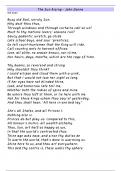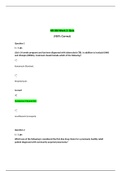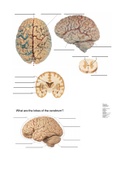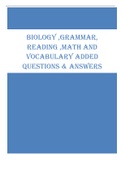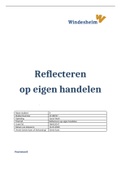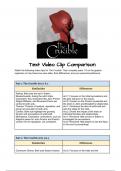The Sun Rising - John Donne
IEB 2025
Busy old fool, unruly Sun,
Why dost thou thus,
Through windows and through curtains call on us?
Must to thy motions lovers' seasons run?
Saucy pedantic wretch, go chide
Late school-boys, and sour 'prentices,
Go tell court-huntsmen that the King will ride,
Call country ants to harvest offices;
Love, all alike, no season knows, nor clime,
Nor hours, days, months, which are the rags of time.
Thy beams, so reverend and strong
Why shouldst thou think?
I could eclipse and cloud them with a wink,
But that I would not lose her sight so long:
If her eyes have not blinded thine,
Look, and tomorrow late tell me,
Whether both the Indias of spice and mine
Be where thou left'st them, or lie here with me.
Ask for those kings whom thou saw'st yesterday,
And thou shalt hear, 'All here in one bed lay."
She's all States, and all Princes I;
Nothing else is.
Princes do but play us; compared to this,
All honour's mimic; all wealth alchemy.
Thou, Sun, art half as happy as we,
In that the world's contracted thus;
Thine age asks ease, and since thy duties be
To warm the world, that's done in warming us.
Shine here to us, and thou art everywhere;
This bed thy centre is, these walls thy sphere.
, - The line addresses the Sun directly in a confrontational
tone, showing irritation at its interference in the
speaker’s life.
- The figure of speech used is personification, as the Sun
is described as "busy" and "unruly," giving it human
qualities of being overly active and disobedient.
- The speaker accuses the Sun of disturbing lovers'
Busy old fool, unruly Sun,
private time.
- An apostrophe (a form of direct address) is present as
the Sun is spoken to as though it can hear and respond.
- The comma after "fool" separates the initial insult from
the following adjective, emphasizing the criticism.
- This opening line conveys the speaker's frustration and
sets a playful, dramatic tone for the poem.
- The speaker questions the Sun's intrusion into their
private moment by asking why it peers through
Why dost thou thus, windows and curtains.
- This line personifies the Sun, attributing it with human
qualities like curiosity and rudeness, making it seem
like an unwelcome busybody.
- The question mark emphasizes the speaker's frustration
and disbelief at the Sun's interference.
Through windows and - The imagery of sunlight filtering through windows and
through curtains call on us? curtains evokes a sense of disruption, as if the Sun is
invading their intimate space.
- The line questions why lovers must conform to the Sun's
movements and the passage of time it represents.
- This rhetorical question conveys frustration,
emphasizing that love should be free from such
Must to thy motions lovers' constraints.
seasons run? - The personification of the Sun as an intrusive force
highlights its dominance over human affairs, giving it
human qualities like control and interruption.
- The question mark at the end emphasizes the speaker's
challenge to the Sun's authority and invites reflection.
- The line is a sharp, dismissive insult aimed at the sun,
calling it arrogant and overly precise.
- It personifies the sun, giving it human qualities to
scold, which intensifies the anger and frustration in
the speaker's tone.
- "Saucy" suggests boldness, implying the sun is
Saucy pedantic wretch, go interrupting the speaker's private time.
chide - "Pedantic" refers to being overly concerned with small
details, which in this context critiques the sun's
relentless precision in following its motions.
- "Wretch" is a harsh term that dehumanizes the sun,
calling it a miserable.
- "Go chide" means to go and scold. In this context, the
speaker is telling the sun to go and scold others, like
schoolboys or apprentices.
IEB 2025
Busy old fool, unruly Sun,
Why dost thou thus,
Through windows and through curtains call on us?
Must to thy motions lovers' seasons run?
Saucy pedantic wretch, go chide
Late school-boys, and sour 'prentices,
Go tell court-huntsmen that the King will ride,
Call country ants to harvest offices;
Love, all alike, no season knows, nor clime,
Nor hours, days, months, which are the rags of time.
Thy beams, so reverend and strong
Why shouldst thou think?
I could eclipse and cloud them with a wink,
But that I would not lose her sight so long:
If her eyes have not blinded thine,
Look, and tomorrow late tell me,
Whether both the Indias of spice and mine
Be where thou left'st them, or lie here with me.
Ask for those kings whom thou saw'st yesterday,
And thou shalt hear, 'All here in one bed lay."
She's all States, and all Princes I;
Nothing else is.
Princes do but play us; compared to this,
All honour's mimic; all wealth alchemy.
Thou, Sun, art half as happy as we,
In that the world's contracted thus;
Thine age asks ease, and since thy duties be
To warm the world, that's done in warming us.
Shine here to us, and thou art everywhere;
This bed thy centre is, these walls thy sphere.
, - The line addresses the Sun directly in a confrontational
tone, showing irritation at its interference in the
speaker’s life.
- The figure of speech used is personification, as the Sun
is described as "busy" and "unruly," giving it human
qualities of being overly active and disobedient.
- The speaker accuses the Sun of disturbing lovers'
Busy old fool, unruly Sun,
private time.
- An apostrophe (a form of direct address) is present as
the Sun is spoken to as though it can hear and respond.
- The comma after "fool" separates the initial insult from
the following adjective, emphasizing the criticism.
- This opening line conveys the speaker's frustration and
sets a playful, dramatic tone for the poem.
- The speaker questions the Sun's intrusion into their
private moment by asking why it peers through
Why dost thou thus, windows and curtains.
- This line personifies the Sun, attributing it with human
qualities like curiosity and rudeness, making it seem
like an unwelcome busybody.
- The question mark emphasizes the speaker's frustration
and disbelief at the Sun's interference.
Through windows and - The imagery of sunlight filtering through windows and
through curtains call on us? curtains evokes a sense of disruption, as if the Sun is
invading their intimate space.
- The line questions why lovers must conform to the Sun's
movements and the passage of time it represents.
- This rhetorical question conveys frustration,
emphasizing that love should be free from such
Must to thy motions lovers' constraints.
seasons run? - The personification of the Sun as an intrusive force
highlights its dominance over human affairs, giving it
human qualities like control and interruption.
- The question mark at the end emphasizes the speaker's
challenge to the Sun's authority and invites reflection.
- The line is a sharp, dismissive insult aimed at the sun,
calling it arrogant and overly precise.
- It personifies the sun, giving it human qualities to
scold, which intensifies the anger and frustration in
the speaker's tone.
- "Saucy" suggests boldness, implying the sun is
Saucy pedantic wretch, go interrupting the speaker's private time.
chide - "Pedantic" refers to being overly concerned with small
details, which in this context critiques the sun's
relentless precision in following its motions.
- "Wretch" is a harsh term that dehumanizes the sun,
calling it a miserable.
- "Go chide" means to go and scold. In this context, the
speaker is telling the sun to go and scold others, like
schoolboys or apprentices.

